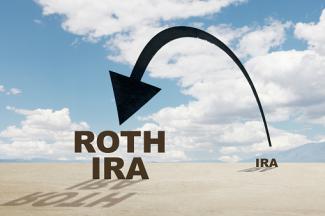
Is age 65 too late for a Roth conversion?
QUESTION: We have all our savings in 401k and Vanguard IRA accounts. This appears to be the old way of thinking. We did not take advantage of the Roth, and now at 65 do not see it cost effective to transfer our regular IRA to a Roth? What is your advice on this?
ANSWER: Indeed, Roth conversions (or at least discussions about them) have become trendy in the field of financial planning. The short answer to whether or not they are appropriate for you is (like many things related to financial planning and taxes) is “it depends.” The longer answer is a bit more complicated.
But first: background and benefits
Roth IRAs have been around for more than 20 years, but it has taken nearly as long for people to see the benefits of contributing to them, and not everyone is eligible to contribute (Roth IRAs have income phaseout limitations). The ability for employees to make Roth contributions to their company retirement plans has been a new development in recent years, and, while not all employer-sponsored plans have this feature, it has certainly given the option of creating Roth dollars to more people than ever before.
Roth dollars differ from pre-tax dollars in that taxes are paid on the Roth contribution in the year it’s made, but, once a few conditions are met, those original funds plus any growth can be withdrawn tax-free.
Roth conversions: the basics
A third way that people can shift funds into Roth is by doing a Roth conversion. This entails moving funds from a pre-tax IRA directly into a Roth IRA, paying tax on that dollar amount, and then allowing the growth to accumulate tax-free in the Roth IRA.
Roth conversions are currently a popular topic among a slightly older group of people (commonly around retirement age) because 1) that demographic group is less likely to have had the opportunity to contribute to a Roth over the course of the previous decades, and 2) lower income in retirement means a lower tax bracket, making Roth conversions more appealing than they would have been when one or both partners were working (when income, and therefore taxes, were higher).
Are conversions worth it?
The question then becomes: Are Roth conversions worth it? Is it worth it to pay a lot of taxes now, in exchange for tax-free growth in the future? At what point do you break even, earning back the dollars that you’ll pay now on the conversion’s tax liability?
A common-but-unhelpful way to measure holds that it’s all about the tax brackets: that is, if you are in a higher tax bracket now than you will be in retirement, then don’t convert anything to Roth; but if you are in a lower tax bracket now than you will be in retirement, then a conversion now makes sense.
However, we think that this adage is short-sighted, as it only compares the current vs future tax liabilities of the conversion itself. Importantly, this viewpoint fails to consider the value of all the tax-free growth and all the taxes that will not have to be paid, for as long as the funds remain in the Roth.
Time horizon: a much better consideration
Really, whether or not to convert pre-tax funds to Roth depends on the potential time horizon for the eventual Roth funds.
Let’s pretend have a pre-tax IRA, and you convert the whole thing to Roth.
If you find yourself drawing on the Roth IRA, say, within a year, one could fairly easily determine that paying the tax on the conversion wasn’t worth it – that the dollars you paid in tax are probably more than any particular tax-free growth that you managed to obtain once the funds landed in the Roth. So, you might as well have not bothered to convert at all.
But, if you convert your IRA to a Roth and don’t find yourself needing to use the Roth funds for 10 or 15 years or more, now the tax cost that you have to pay up front might begin to make sense, because there will be more time for tax-free dollars to accumulate in the Roth.
And, further: what if you convert an IRA to Roth, and then never touch those funds (perhaps because you have enough income or other assets to support you)? This could mean that the Roth account, with all of its embedded post-tax dollars and future tax-free growth, is passed to heirs, and continues to grow for decades or more. Then Roth conversions become very compelling.
Financial planners to the rescue
Even if there’s a clear case for Roth conversions, performing them can be complicated in that they can trigger further tax ramifications. Increases in income due to conversions can result in a higher tax bracket, greater taxation of Social Security, future Medicare premium surcharges, and the loss of some deductions, among other hidden costs.
Further, with no limits on how much can be converted each year people often wonder: should I convert my entire pre-tax IRA all in one year? Spread conversions out over multiple years? Should I limit how many dollars I convert every year? Is my ultimate goal to draw down my pre-tax IRA funds completely? To create a Roth IRA with a certain amount in it? Something else?
A good financial planner with tax planning experience should be able to help you noodle through what you are trying to achieve with Roth conversions (tax-free income for you only? For heirs?). From there he or she should be able to model your current, future, and cumulative tax liability for a variety of Roth conversion scenarios, which should give you insight into this potentially valuable tax-savings technique.
Roth conversions are not the right answer for everyone. But the longer the time horizon for the future Roth funds, the more compelling the strategy becomes.
